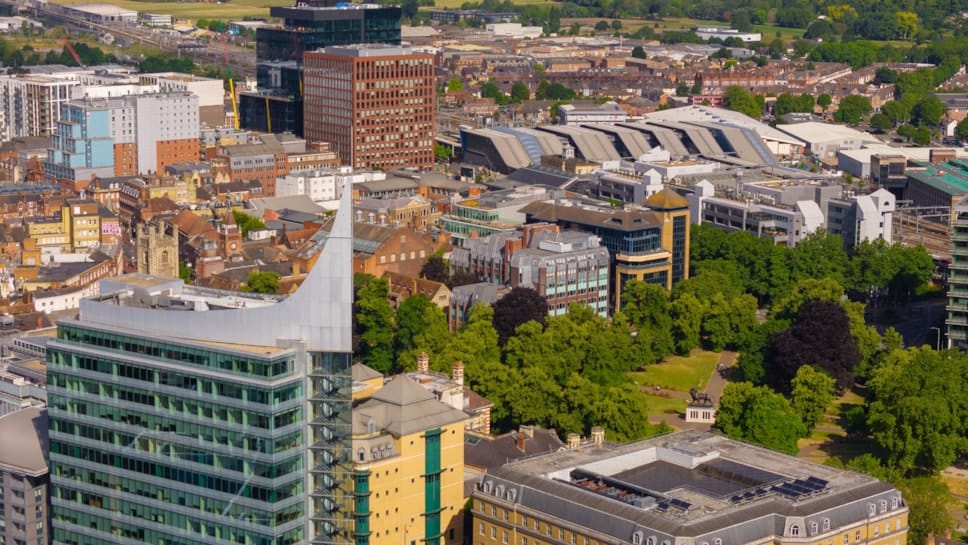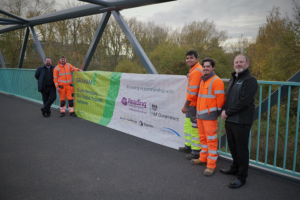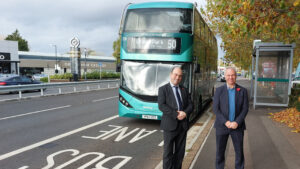Reading’s carbon emissions have fallen by 54% since 2005 – the 12th largest reduction in the country, according to a new report.
The Council’s own carbon footprint has also been cut by 72.7% since 2008/09 and it has reduced its use of fossil fuels by 57% over the same period.
Major Council projects are under way to further reduce carbon emissions in response to the climate emergency but more work is needed across the borough to reach ambitious targets for Reading to become net-zero by 2030.
Updates on the progress of the borough’s and Council’s climate emergency plans are contained within two reports being presented to the Strategic Environment, Planning and Transport (SEPT) committee on 20 November.
The annual report on the Reading Climate Emergency Strategy 2020-25, produced by the Reading Climate Change Partnership, shows there has been a three percent year on year reduction in carbon emissions in the borough, resulting in a 54% cut since 2005, when comparable data was first published.
Reading’s per capita emissions remain the lowest in Berkshire and lower than the South East and UK average.
The report also highlights case studies of climate action taken by local organisations, including:
University of Reading: Named Sustainable University of the Year by The Times and No1 in the People & Planet University League Table. The university is also delivering climate education to schools through a Climate Ambassadors Scheme and recently started work on replacing gas boilers with two air-source heat pumps at its SportsPark.
Reading Economy and Destination Agency (REDA): Reading Central and Abbey Quarter Business Improvement Districts (BID) offer free collection and recycling of cardboard and waste from electrical and electronic equipment (WEEE) to businesses. Last year, the BID recycled 336 tonnes of cardboard, an increase of 38% on the previous year, and six tonnes of WEEE.
School Streets: Two new School Streets were set up in Reading in July, covering four schools. Civitas Academy, launched a scheme in Great Knollys Street, central Reading, and Geoffrey Field Infant School, Geoffrey Field Junior School and Christ the King Roman Catholic Primary School introduced a scheme in Exbourne Road, Whitley, with support from the Council.
Reading West Station: Great Western Railway, Network Rail and the Council worked together to deliver major improvements to Reading West Station. The £5m project included a new station building with information counter and customer toilets, new ticket gates and new bus interchange to encourage use of public transport.
The Council’s greenhouse gas emissions report has been produced annually since 2008/09 and shows a 72.7% reduction in its carbon footprint in that time.
This is a slight increase on the previous year’s figure due partly to the national grid seeing an increase in power generated from gas fired power station.
However, there are several major projects currently being undertaken by the Council which will deliver significant cuts in emissions in the future:
Bennet Road: The Council is working to make this site a zero-carbon depot. Gas boilers have already been replaced with air source heat pumps and solar panels and the last few diesel bin lorries have been replaced with a fully electric fleet. Solar clad canopies above car parking areas are due to be built in 2025.
Civic Offices/Hexagon Theatre: Work is currently under way to replace gas heating with air source heat pumps at the Civic Offices in Bridge Street. A decarbonisation project at the Hexagon Theatre will include the use of ground source heat pumps.
Leisure Centres: Heat pumps and solar panels have been installed in the new Rivermead and Palmer Park leisure centres. This has contributed to a 40% reduction in carbon emissions across Reading’s four leisure centres, managed by Greenwich Leisure Ltd, since the last pre-Covid year of 2019/20.
Green Event Code of Practice (GECOP): Organisers of events in Reading have been working together, and with the Council, to make sure they are as sustainable as possible. Organisers of events ranging from the community-based East Reading Festival to the internationally renowned Reading Festival have been taking part in the GECOP trial. The Council has also been working to ensure its own events, such as Water Fest, have minimal impact on the environment.
Despite these encouraging statistics, the Council’s carbon emissions only account for 1.5% of Reading’s overall carbon footprint, highlighting the importance of climate action being taken by other organisations and individuals across the borough.
Cllr John Ennis, Lead councillor for Climate Strategy and Transport, said: “These annual reports highlight the great work that is taking place across the borough in response to the climate emergency.
“We are seeing the borough’s carbon emissions continuing to fall, with Reading achieving the 12th biggest reduction out of 374 local authorities across the country.
“The Council is committed to reducing its own emissions through a wide range of projects which should see significant results in the future. But the Council’s emissions only account for 1.5% of Reading’s overall carbon footprint.
“We want to see Reading continue to thrive and succeed while being a safe, clean and healthy place to live and visit.
“It is only by all of us taking local climate action as individuals, businesses, organisations and communities that we will achieve our ambitious aim of being a net-zero borough.”
Heather Marshall and Dylan Parkes, co-chairs of Reading Climate Change Partnership, said:
“We don’t have to engage in grand, heroic actions to participate in change. This past year has shown us that small acts, delivered by many, can help us on our journey to net zero. We are proud of the climate initiatives being delivered by our neighbours, local community groups, and businesses. We recognise no single organisation can deliver net zero alone, nor should they have to.
“The Reading Climate Change Partnership is working on Reading’s next Climate Emergency Strategy, bringing people together to help define the town’s climate action priorities for 2025 – 2030. The new strategy will help people who live, work, study and play in Reading to contribute to the goal of reaching net zero by 2030. Some organisations will need to take bigger steps than others, but it is worth remembering that even small steps can make a big difference if thousands of us take them together.”
The Reading Climate Emergency Strategy 2020-25 annual report and Council’s Greenhouse Gas Emissions annual report, and covering report, can be found within the papers for the Council’s SEPT committee meeting on 20 November
























